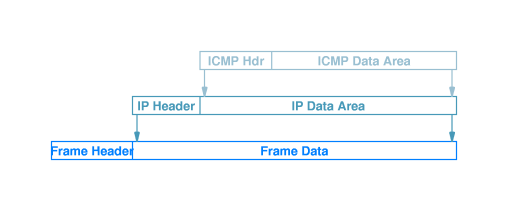(rev. 01/13/2008)
Notes On Chapter Twenty-Three
-- An Error Reporting Mechanism (ICMP)
- 23.1 Introduction
- ICMP is an
error-reporting protocol integrated with IP.
- It was originally intended as a means to tell a sender why its packets failed to
arrive at their destination.
- It is also exploited to gather information
about an internet.
- 23.2 Best Effort Semantics And Error Detection
- When a checksum in an IP packet is bad,
the router or host that receives the packet just discards the packet without attempting to
forward the packet or send an error message to the sender.
- The reason is that both the source and target
addresses are "suspect" if the checksum is bad.
- 23.3 Internet Control Message Protocol
-
 The figure at right shows all the ICMP message types (c.f. page 357
of the fourth edition).
The figure at right shows all the ICMP message types (c.f. page 357
of the fourth edition).
- Examples: Source Quench, Time Exceeded
(for TTL expiry, or fragment reception expiry), Destination
Unreachable (can't forward to host or to network), Redirect (host
sent a datagram to the wrong router on the LAN), Echo Request/Reply,
Address Mask Request/Reply (booting hosts gets the correct mask used
on the local subnet. )
- 23.4 ICMP Message Transport
-
 ICMP datagrams are encapsulated in IP
datagrams.
ICMP datagrams are encapsulated in IP
datagrams.
- Mostly, routers send ICMP messages
relating to a problem with an IP datagram back to the sender.
- An ICMP packet can be a reply to an ICMP request packet.
- The protocol does not allow sending an error
message about an error message.
- 23.5 Using ICMP Messages TO Test Reachability
- Ping uses ICMP echo request/reply.
- 23.6 Using ICMP To Trace A Route
- Traceroute discovers addresses of routers by setting the TTL field
and reading off the address of the router that
sends back the "time exceeded" message.
- The first packet is sent with TTL==1, and the first router sends
back "time exceeded" (unless it is the final destination).
- Problems: duplicate responses, lost datagrams, and changing routes.
- 23.7 The Last Address Printed by Traceroute
- The "time exceeded" trick does not work to get
a reply from the final destination.
- Traceroute sends something that requires a
response from the destination host: an ICMP echo request, or
a UDP packet with a bogus port number.
- The destination host should respond with an echo reply or
"destination unreachable" message.
- 23.8 Using ICMP For Path MTU Discovery
- Where routes are stable path MTU can be discovered by trial and
error.
- Mark a large packet "do not fragment" and see
if you get an ICMP "Datagram Conversion Error" packet back
from a router, meaning that the packet needed to be fragmented but
the router was not allowed to do it.
- Send smaller and smaller packets until you stop
getting this error message back.
- 23.8 Summary
 The figure at right shows all the ICMP message types (c.f. page 357
of the fourth edition).
The figure at right shows all the ICMP message types (c.f. page 357
of the fourth edition).  ICMP datagrams are encapsulated in IP
datagrams.
ICMP datagrams are encapsulated in IP
datagrams.